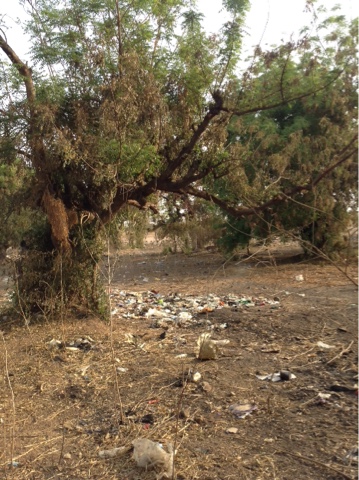The art world would be abuzz at the beauty and texture of the arrangements. Pollack could do no better.
It may be garbage, but I gaze upon its clusters not with repugnance, but with respect and wonder. They elevate rather than deflate my spirit. I have become like everyone else dropping my litter on the ground wherever I might be, happy to make a contribution, letting the winds place it where it chooses. Some of the most eye-catching arrangements are in the thicker weeds with plastic bags adorning trees and bushes. It's not litter, it's art. Towns can be proud of their creations.
The palettes of garbage are occssionally embellished with goats or pigs nuzzling through the refuse and rearranging it.
Unlike the huge mounds of city dumps off in their own quarter, these are an actual part of the landscape and a town's daily life.
It is everywhere. wherever one might look. It can be found on every street and road in some form or another. Hopefully, I won't become so accustomed to it that I will take it for granted and it will lose its splendor.
Though I have come to appreciate the profusion of garbage, I am not so enamored with the ramshackle gauntlet of run-down tiny shops that define and line the main street through every town I pass through. There is little to distinguish one town from another. No one seems to care about giving their town any distinction or attraction. Senegal and Mali may have been French colonies, but they gained none of the French desire to beautify their towns with flowers and sculptures and town halls of distinction.
In France every village seems to be vying for recognition as a "Beaux Ville," as attentive to its appearance as the average French woman with her makeup and attire. Every town is a gem. In comparison it's hard not to regard every African town a slum. Maybe with more time I can come to recognize them as something more. I'm told litter didn't use to be such a scourge, that people would find some use for every scrap. Maybe the prevalence of garbage is an initial step to beautification.
The remote fishing village of Cap Skirring, near the border with Guinea-Bissau, that is being transformed into a resort complete with a Club Med, adorned its roundabout with a pair of sculptures.
No effort though had been made to add any allure to its main street nor to tidy up the heart of its beach where the fishermen bring in their catch. It was a vast network of dilapidated shacks dominated by the stench of rotting fish. I had taken a 45-mile side trip from Ziguinchor to give the beaches of Cap Skirring, considered the best in Sengal, a look and take a rest day while I awaited the twice-a-week ferry from Ziguinchor to Dakar. As I searched for a place to camp, I was terrorized by a squadron of tourists rampaging on ATVs.
I was tempted to turn around and head back to Ziguinchor. But I found a bungalow complex on the outskirts of town that offered camping space. It wasn't on the beach, but it offered the quiet that I sought and a clothes line for my wash. I had asked a handful of people, including a long-haired French guy who had lived in Cap Skirring for years, if they knew of a place that offered camping. None did, though they offered suggestions on where I might try. The French guy put in a call to a friend who might let me pitch my tent on his property, but he wasn't answering. But persistence once again paid off.
Among those staying in the bungalows was a French couple who had been coming to Cap Skirring for twenty years staying at the same place. I was the first person who had ever camped there during their time. Camping is simply not part of the local culture, and travelers inclined to camp aren't drawn to Cap Skirring or aren't traveling with the capacity to do it. Shockingly one can fly into this small town directly from Pairs. There is a twice-weekly Club Med flight. Cap Skirring was actually a Club Med discovery and is responsible for its becoming known. The French couple said the town was more popular when they first started coming. It's presently in decline. It still attracts sex tourists, almost as many women as men. The French couple acknowledged a local woman becoming a prostitute could give her the means to open a boutique, but the men who engage in the trade are much greedier, hoping to get enough money to buy a car or more. They lose their work ethic. There is a shortage of men who are willing to do hard work. The area used to abound in rice paddies, but it is now difficult to find people willing to engage in such work.
As in The Gambia not many of the tourists were drawn to the beach. There were as many bovines as people on the sand.
I had opted the night before to camp rather than stay at a hotel with a young pony-tailed Swiss guy who I had met at the Sukuta campground. We were both happy to see a familiar face when we encountered each other late in the day in the town of Oussouye, seventeen miles before Cap Skirring. He said he was the only guest at an auberge several blocks away. It was tempting to have a sociable evening, but I had my heart set on camping among the palm trees that had taken over the countryside as I approached the ocean, giving a hint of paradise. And as I sat in my tent eating and reading in complete and utter silence gazing up at the palm trees around me, I was happy to have another genuine African experience of my own.


















































